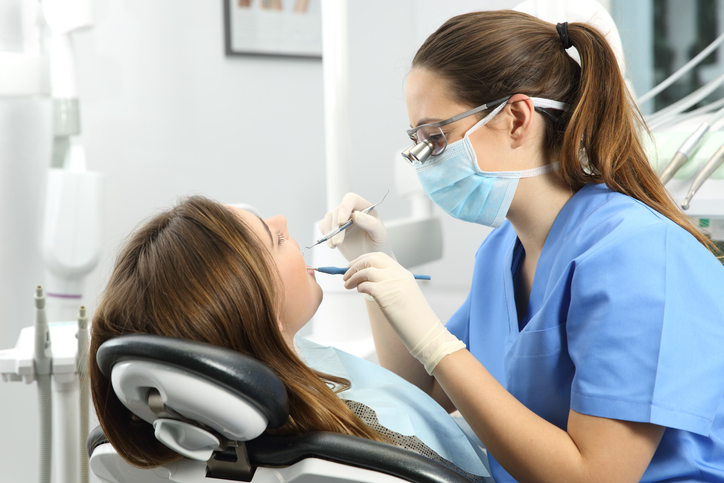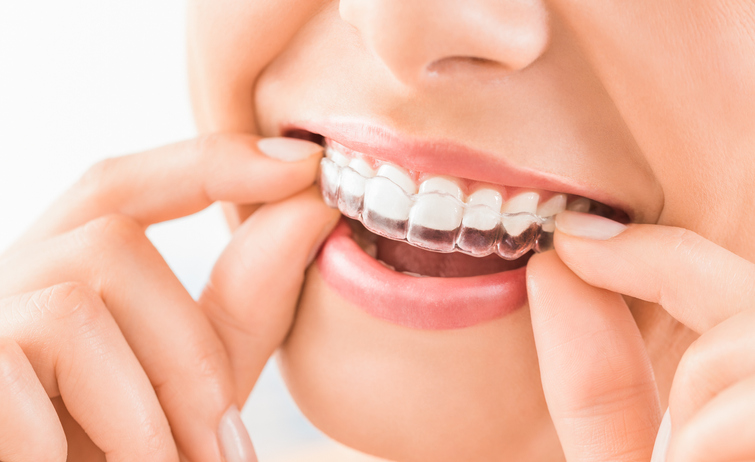-
Oral Care When the Flu or a Cold Strikes

When you have a cold or the flu, your oral health may also suffer. Not only can having respiratory symptoms make your mouth taste bad and your breath feel less than fresh, but you also may not feel like getting up and brushing and flossing as normal. However, taking care of your oral health is an essential part of getting better. These tips will help you get through your illness with your oral health intact.
Use Sugar-Free Cough Drops
Cough drops can help to ease your coughing and congestion when you have a cold or the flu, but be sure to pick ones that are sugar-free to protect your teeth. Regular cough drops are like pieces of candy, and when you suck on them, the sugar will build up on your teeth and feed bacteria. Check the label for ingredients like fructose and corn syrup, and opt for ones that say sugar-free on the package. If you can’t find any sugar-free versions of cough drops, limit your consumption of them and brush your teeth after eating one.
Stay Hydrated
Hydration is always important when you are sick. In addition to helping your body heal, it also helps you avoid developing dry mouth. Dry mouth is a common problem when you’re taking cold and flu medications, because the antihistamines in these products can dry you out. Water is the best option, but tea without sugar, honey, or lemon will also help to prevent dry mouth without increasing your risk for cavities.
Brush and Floss as Normal
You may not feel like brushing and flossing, but it is important to do so, even when you’re feeling sick. You may even find that brushing and flossing helps your mouth feel fresh so you feel a little healthier. When your body is already fighting your cold or flu infection, adding gum disease or tooth decay into the picture will only prolong your illness.
At your next dental exam and teeth cleaning in Hazlet, ask your dentist at Glenwood Premier Dental about more ways you can protect your oral health for life. We treat everything from loose teeth and bad breath to gum disease and cosmetic problems. To make an appointment, call us at (732) 264-4477.
-
What Is a Dry Socket?

One of the potential side effects of having a tooth extracted is a dry socket. Your dentist will tell you things that you can do to prevent a dry socket as you recover. If you think you could be developing one, call your dentist as soon as possible so that he or she can provide treatments to alleviate the pain and promote healing.
Dry sockets occur when the clot that forms over the socket where your tooth stood is displaced. When the clot moves, the nerves and bones are exposed, which can be painful. Smoking or using a straw before the site of the extraction is healed increases the risk of developing a dry socket. If you have a dry socket, your dentist can use a medicated dressing to fill the socket and may recommend taking pain medications to ease the discomfort.
When you have a tooth extracted at Glenwood Premier Dental, our dentist will provide detailed aftercare instructions to help you recover quickly with a minimal risk of complications. For professional dental care in Hazlet, call us today at (732) 264-4477.
-
Quitting Smoking Before Dental Implant Surgery

If you have missing teeth, dental implants provide a natural-looking replacement to help you feel more confident in your smile. They don’t require any of the special cleaning methods or dietary changes that dentures do, and they won’t move around in your mouth. However, if you are undergoing dental implant surgery and you are a smoker, your dentist will likely ask you to quit before your procedure. Here is why quitting is important and what you can do about it.
Why Quitting Before Dental Implant Surgery Matters
Any time you have surgery, smoking can interfere with a healthy recovery. It can cause problems with blood clotting and make you more prone to infection. With dental procedures, smoking also increases the risk of developing a painful dry socket. Smoking is associated with a wide range of oral health problems, including gum disease and tooth decay, so smoking after an oral surgery can have a serious impact on your healing.
In addition, a recent study on dental implant patients showed that people who smoke have a higher risk of dental implant failure. Researchers followed dental implant recipients for five years, and they had an implant failure rate of 15.8%. The failure rate in non-smokers was 1.4%.
Suggestions for Quitting Smoking
If you’re having dental implant surgery and you want to quit, talk to your dentist. He or she may be able to offer resources that can help. Your doctor may also be able to prescribe medications that help to control your cravings or recommend other strategies that may be helpful to you.
You don’t have to quit cold turkey, though some people do. Today, there is a wide range of quit aids that help you step down your tobacco usage and manage your withdrawal symptoms.
If you have missing teeth, talk to your dentist at Glenwood Premier Dental today to find out if you are good candidate for dental implants. Your dentist can also explain how your smoking could impact your treatment and offer suggestions to help you quit. Learn more about dental implants in Hazlet by calling (732) 264-4477.
-
A Look at Laser Dentistry and Gum Disease
Gum disease is a serious threat to your oral health and your overall well-being. At Glenwood Premier Dental, we are pleased to give patients a cutting-edge treatment option using laser dentistry.
Watch this video to learn more about laser dentistry. By using laser treatments, your dentist can alleviate the infections and deep pockets that occur with gum disease in a single treatment session, with much less pain and recovery time.
To find out if laser dentistry is right for you, make an appointment at Glenwood Premier Dental for a consultation. You can schedule your visit with our dentist in Hazlet by calling (732) 264-4477.
-
What Are the Advantages of Invisalign?

After Invisalign was first approved by the FDA in 1998, it quickly became a household name. These wildly popular clear aligners are an effective, convenient, and comfortable way to straighten crooked teeth. One of the main advantages of Invisalign is their discreet nature. The aligners are virtually invisible, which makes them ideal for self-conscious teens. It’s also why orthodontists often recommend this treatment for adults.
Another major benefit of Invisalign is that the aligners are comfortable. There are no hard metal brackets or wires that can become loose and poke the gums. You can safely play sports while wearing your aligners, without worrying about the soft tissue injuries that might be caused by metal braces. And since you’ll remove the aligners before each meal and snack, you won’t have any dietary restrictions during your treatment.
Glenwood Premier Dental is proud to be a leading Invisalign provider in Hazlet. To find out whether Invisalign could be right for you, call our office at (732) 264-4477.
-
How to Reduce Your Risk of Oral Cancer

Not only is oral cancer deadly, but it’s also one of the most potentially disfiguring types of cancer. Treating it may require surgery to remove part of the jaw, and permanent disfigurement of the face is often the result. Oral cancer and its treatments are painful and emotionally distressing. Fortunately, it’s also largely preventable. Talk to your dentist about reducing your risk of oral cancer. You should also get screened, since treating oral cancer in its early stages may offer the most favorable prognosis.
Quit using tobacco.
Cigarettes, cigars, and chewing tobacco directly cause throat and mouth cancers. There’s no good reason to use tobacco, and plenty of reasons to quit. The longer you continue to smoke, the higher your risk is of developing potentially deadly oral cancer. Nicotine addictions are difficult to overcome, but you can do it with help from your doctor and the support of your loved ones.
Limit your alcohol consumption.
Consuming alcohol to excess can increase your risk of oral cancer. If you smoke and drink alcohol, your risk skyrockets. According to The Oral Cancer Foundation, people who smoke and consume alcohol have a risk of this disease that’s 15 times greater compared to non-smokers who don’t drink. Among non-smokers, an acceptable level of alcohol consumption is generally considered to be no more than two drinks daily for men and no more than one drink daily for women.
Consider getting an HPV vaccine.
Another risk factor of oral cancer is carrying the human papillomavirus (HPV). Some strains of HPV can also increase the risk of cervical cancer in women. Doctors recommend that children and adolescents get the HPV vaccine, before they’ve had a chance to be exposed to the virus. However, even if you’re an adult, your doctor might still recommend the HPV vaccine. Talk to your doctor about whether the shot might be right for you.
An oral cancer screening is part of your comprehensive dental exam at Glenwood Premier Dental. If you notice unusual symptoms between regular visits, you can schedule an additional oral cancer screening in our Hazlet office. Call (732) 264-4477.
Periodontal Care 101

Dentists, periodontists, and dental hygienists can all perform periodontal care. Periodontal care typically refers to preventing, diagnosing, and treating periodontal disease. Also called gum disease, this condition usually occurs because of poor oral hygiene. Smoking is also a major contributor.
Recognizing Periodontal Disease
Gum disease is an infection. The bacteria in your mouth can form plaque, which is a sticky film that adheres to the teeth. The plaque can turn into hardened tartar, which irritates the gums and lead to the infection of the tissue. Periodontal disease grows progressively worse the longer it’s left untreated. During the initial stage, you might notice symptoms like:
- Puffy, red gums
- Tenderness of the gums
- Bleeding while brushing or flossing
- Bad breath
As periodontal disease becomes more severe, the symptoms can include:
- Gums pulling away from the teeth
- Persistent bad taste in the mouth
- New spacing between teeth
- Loose teeth
- Pus
It’s possible to eventually lose teeth because of gum disease.
Diagnosing Periodontal Disease
If you have a dental exam every six months, your dentist can detect periodontal disease before it progresses too far. Don’t hesitate to schedule an extra appointment if you notice any unusual changes with your mouth. During your appointment, the dentist or hygienist can use a special tool to measure the pockets between the gums and the teeth. Large pockets are indicative of gum disease. The dentist will also visually examine your gums for signs of gum disease.
Treating Periodontal Disease
If you do have gum disease, the treatment depends on how advanced it is. For patients in the early stage of gum disease, scaling and root planing can be effective. This is a deep cleaning technique. You’ll also need to improve your oral care at home, and if you’re a smoker, you should quit. If your gum disease is too advanced to be treated by scaling and root planing, your dentist may recommend pocket reduction and gum graft surgery.
Periodontal care is one of our specialties here at Glenwood Premier Dental. Our friendly dentists and hygienists can expertly diagnose gum disease and recommend an appropriate course of treatment for you. Call (732) 264-4477 to request an appointment for gum disease treatment in Hazlet.
Are Your Medications Affecting Your Oral Health
Each time you visit the dentist, you should bring a current list of your medications, including over-the-counter drugs. Your dentist needs your updated medical history because certain medical conditions and medications can affect your oral health. To hear about one possible effect, watch the accompanying video.
It explains that some drugs, such as antihistamines, may have side effects like dry mouth, or xerostomia. Your mouth relies on saliva to wash away food particles and bacteria. Because of this, dry mouth can increase the risk of cavities and gum disease. Your dentist can suggest treatment options for dry mouth, including saliva replacement products and lifestyle adjustments.
You can schedule your next dental exam in Hazlet by calling (732) 264-4477. Glenwood Premier Dental always welcomes questions about oral health from new and current patients.
Preparing for Your First Appointment
At your first appointment at Glenwood Premier Dental, you will find a welcoming and caring team using the very latest advances in dental care technologies to keep your smile healthy. We’re committed to providing the best possible dental care for you, so during your first appointment, we will gather all of the information we need to create a plan for our specific health needs.

During your first appointment, you may undergo digital x-rays as well as a dental exam. Our dentist will conduct an in-depth consultation with you to understand your overall health and any specific problems you are experiencing. If you have dental insurance, bring your card with you. Every new patient receives a personalized financial consultation to understand the cost of his or her care plans and options for paying for treatment. We’ll then work closely with you to schedule future appointments according to the care plan your dentist recommends.
Get the dental care you need by scheduling an appointment at Glenwood Premier Dental for care. Call (732) 264-4477 for more information or to schedule a dental exam in Hazlet.
What Really Happens to Your Teeth When You Don’t Floss
Your dentist probably tells you at your teeth cleanings that you should floss at least once per day, but what really happens if you don’t make it part of your oral hygiene routine? As this video explains, flossing is essential not just for your oral health but for your overall health as well.
If you don’t floss, your gums are likely to become inflamed in response to the buildup of bacteria, which will trigger an immune system response. The inflammation can also cause a range of complications, including heart disease and low birth weight in babies.
At Glenwood Premier Dental, we make it easy to make your oral health a priority with teeth cleanings, laser dentistry, and restorative care. To schedule an appointment with a dentist in Hazlet, please call (732) 264-4477.
